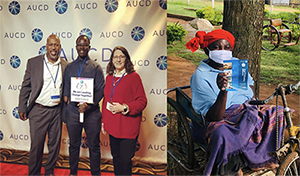AUCD Professional Fellows Alum in Kenya Pinpoints 33,000 Individuals with Disabilities for COVID Cash Relief
June 14, 2020

|
In the global fight against COVID-19, individuals with disabilities face especially harsh challenges in developing countries where essential resources and community services are often inaccessible and limited. In East Africa, AUCD's Professional Fellows alumni are leading the way in determining community needs, delivering relief funds, and developing inclusive emergency response plans for their countries' leaders.
AUCD's African Professional Fellows alumni are disability leaders from Kenya, Tanzania and Uganda who took part in either of AUCD's international exchange programs - the Professional Fellows Program on Inclusive Disability Employment (PFP-IDE), or its predecessor, the ADA International Fellowship Program on Inclusive Education. AUCD has administered these programs with ICI-UMass Boston and Humanity & Inclusion, and the sponsorship of the U.S. Department of State Bureau of Educational and Cultural Affairs since 2017. Together, they have enabled more than 50 disability leaders from Kenya, Tanzania and Uganda to train at UCEDD and LEND before returning home to adapt U.S. best practices learned to inclusive employment and education in Africa.
In Kenya, Professional Fellows (PFP-IDE) alumnus Samuel Odawo is spearheading national efforts to identify persons with disabilities who have the greatest economic vulnerability and food insecurity due to COVID-19. Samuel, who is the founder and CEO of the Ulemavu Research Institute, a disability research agency and consultancy firm, was an AUCD Professional Fellow (PFP-IDE) in 2018, when he studied inclusive employment at the Strong Center for Development Disabilities at the University of Rochester in New York. He is also a prominent blind self-advocate and African disability leader, serving on the Board of Directors of Kenya's National Council for Persons with Disabilities (NCPWD), the country's public agency for promotion of inclusion.
Samuel also chairs the National Council for Persons with Disabilities' COVID Response Team, and is therefore responsible for championing and monitoring disability inclusion in all aspects of the Kenyan government's strategy. On May 29, the government announced a new initiative to provide emergency cash to 33,333 Kenyans with disabilities deemed at especially high risk. Samuel and his colleagues at the NCPWD COVID Response Team were tasked with identifying the individuals with disabilities who will receive the emergency funding. Using data they collected during the COVID crisis, Samuel and his team partnered with the Kenyan government to select all 33,333 emergency cash recipients in just one week, from May 31 to June 7.
The 33,333 Kenyans with disabilities who Samuel and his team identified are spread across every county in Kenya, will each receive 2,000 Kenyan shillings per month over a period of three months, starting in June and ending in August. The money will be provided in the form of mobile phone cash transfers, which are commonly used in Africa. Kenya's government has used them in its social safety net before, recently in the form of small emergency stipends sent to individuals in April as part of the national COVID response strategy. However, the new initiative specifically targets Kenyans with disabilities, whose needs often relate especially well to cash transfer programs like these.
Mobile phone-based cash transfers enable individuals to access banking services (including credit, deposits, withdrawal, and other payments) remotely through their mobile phones, and the Kenyan government began using cash transfer programs to deliver small COVID emergency stipends to at-risk individuals in April. However, those stipends were not targeted directly at individuals with disabilities but at many vulnerable demographic groups other too.
Cash transfer systems have become more useful than ever before during the COVID crisis, as individuals with disabilities are able to access funds and receive and make payments without in-person cash transactions that would violate social distancing restrictions and create logistical and health risks for persons with disabilities.
The initiative will deliver a total 200 million Kenyan shillings (USD $1.8 million) to the Kenyan disability community by August 2020. Although the 33,333 cash recipients make up only a tiny portion of those in dire need, the program is a notable step forward in securing vital resources directly for individuals with disabilities.







